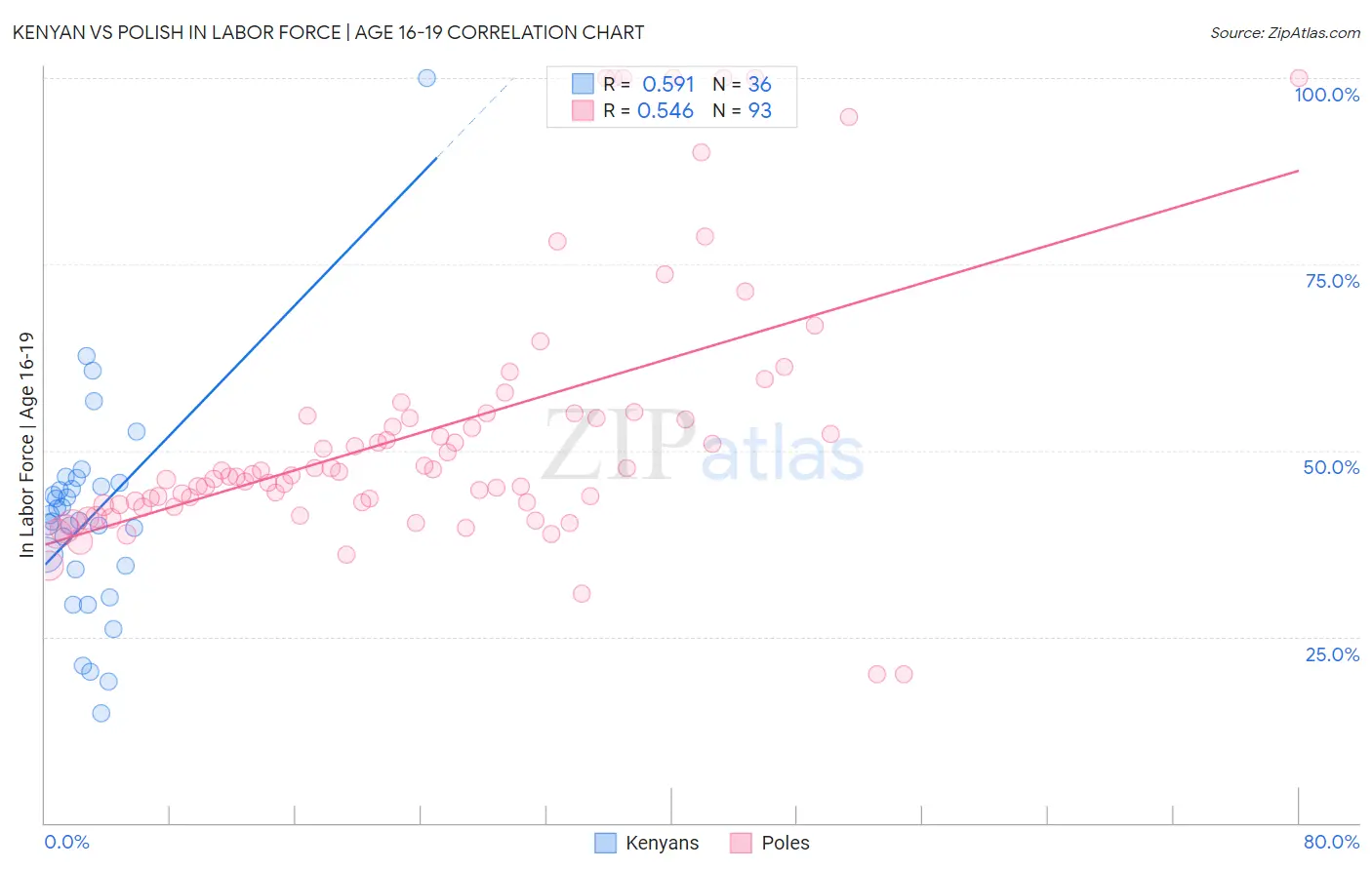Kenyan vs Polish In Labor Force | Age 16-19
COMPARE
Kenyan
Polish
In Labor Force | Age 16-19
In Labor Force | Age 16-19 Comparison
Kenyans
Poles
40.1%
IN LABOR FORCE | AGE 16-19
100.0/ 100
METRIC RATING
65th/ 347
METRIC RANK
42.1%
IN LABOR FORCE | AGE 16-19
100.0/ 100
METRIC RATING
28th/ 347
METRIC RANK
Kenyan vs Polish In Labor Force | Age 16-19 Correlation Chart
The statistical analysis conducted on geographies consisting of 168,228,993 people shows a substantial positive correlation between the proportion of Kenyans and labor force participation rate among population between the ages 16 and 19 in the United States with a correlation coefficient (R) of 0.591 and weighted average of 40.1%. Similarly, the statistical analysis conducted on geographies consisting of 556,989,344 people shows a substantial positive correlation between the proportion of Poles and labor force participation rate among population between the ages 16 and 19 in the United States with a correlation coefficient (R) of 0.546 and weighted average of 42.1%, a difference of 5.0%.

In Labor Force | Age 16-19 Correlation Summary
| Measurement | Kenyan | Polish |
| Minimum | 14.8% | 20.0% |
| Maximum | 100.0% | 100.0% |
| Range | 85.2% | 80.0% |
| Mean | 41.2% | 52.6% |
| Median | 41.0% | 46.8% |
| Interquartile 25% (IQ1) | 34.3% | 42.9% |
| Interquartile 75% (IQ3) | 45.4% | 54.9% |
| Interquartile Range (IQR) | 11.1% | 12.0% |
| Standard Deviation (Sample) | 14.8% | 17.8% |
| Standard Deviation (Population) | 14.6% | 17.7% |
Similar Demographics by In Labor Force | Age 16-19
Demographics Similar to Kenyans by In Labor Force | Age 16-19
In terms of in labor force | age 16-19, the demographic groups most similar to Kenyans are Immigrants from Micronesia (40.2%, a difference of 0.080%), Nonimmigrants (40.1%, a difference of 0.12%), Canadian (40.1%, a difference of 0.13%), Northern European (40.2%, a difference of 0.19%), and Italian (40.1%, a difference of 0.19%).
| Demographics | Rating | Rank | In Labor Force | Age 16-19 |
| Aleuts | 100.0 /100 | #58 | Exceptional 40.4% |
| Slavs | 100.0 /100 | #59 | Exceptional 40.4% |
| Immigrants | Eastern Africa | 100.0 /100 | #60 | Exceptional 40.4% |
| Americans | 100.0 /100 | #61 | Exceptional 40.3% |
| Cherokee | 100.0 /100 | #62 | Exceptional 40.2% |
| Northern Europeans | 100.0 /100 | #63 | Exceptional 40.2% |
| Immigrants | Micronesia | 100.0 /100 | #64 | Exceptional 40.2% |
| Kenyans | 100.0 /100 | #65 | Exceptional 40.1% |
| Immigrants | Nonimmigrants | 100.0 /100 | #66 | Exceptional 40.1% |
| Canadians | 100.0 /100 | #67 | Exceptional 40.1% |
| Italians | 99.9 /100 | #68 | Exceptional 40.1% |
| Potawatomi | 99.9 /100 | #69 | Exceptional 40.0% |
| Portuguese | 99.9 /100 | #70 | Exceptional 40.0% |
| Serbians | 99.9 /100 | #71 | Exceptional 39.9% |
| Iroquois | 99.9 /100 | #72 | Exceptional 39.9% |
Demographics Similar to Poles by In Labor Force | Age 16-19
In terms of in labor force | age 16-19, the demographic groups most similar to Poles are French (42.1%, a difference of 0.050%), Welsh (42.3%, a difference of 0.29%), Scottish (42.0%, a difference of 0.33%), Irish (42.0%, a difference of 0.40%), and English (42.4%, a difference of 0.57%).
| Demographics | Rating | Rank | In Labor Force | Age 16-19 |
| Ottawa | 100.0 /100 | #21 | Exceptional 43.0% |
| Sudanese | 100.0 /100 | #22 | Exceptional 42.9% |
| Slovaks | 100.0 /100 | #23 | Exceptional 42.6% |
| Bangladeshis | 100.0 /100 | #24 | Exceptional 42.5% |
| German Russians | 100.0 /100 | #25 | Exceptional 42.4% |
| English | 100.0 /100 | #26 | Exceptional 42.4% |
| Welsh | 100.0 /100 | #27 | Exceptional 42.3% |
| Poles | 100.0 /100 | #28 | Exceptional 42.1% |
| French | 100.0 /100 | #29 | Exceptional 42.1% |
| Scottish | 100.0 /100 | #30 | Exceptional 42.0% |
| Irish | 100.0 /100 | #31 | Exceptional 42.0% |
| Czechoslovakians | 100.0 /100 | #32 | Exceptional 41.9% |
| Liberians | 100.0 /100 | #33 | Exceptional 41.8% |
| Immigrants | Bosnia and Herzegovina | 100.0 /100 | #34 | Exceptional 41.8% |
| Yugoslavians | 100.0 /100 | #35 | Exceptional 41.8% |